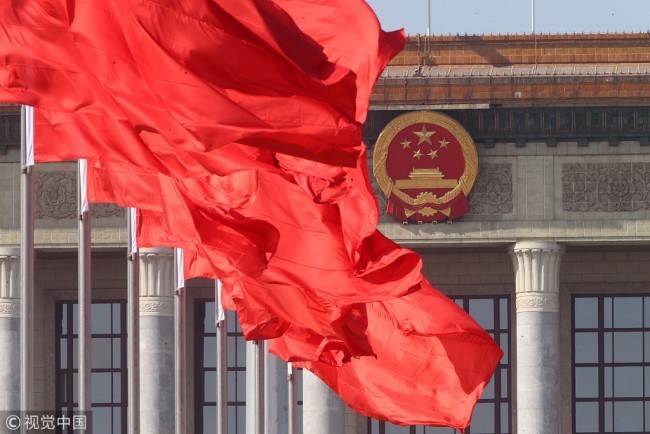
(File Photo: VCG)
A main theme of the on-going Fourth Plenary Session of the 19th Communist Party of China Central Committee is: How to promote modern national governance. It was at the Third Plenary Session of the 18th CPC Central Committee in November 2013 that the Party put forward that "the overall goal of comprehensively deepening reform is to improve and develop the socialist system with Chinese characteristics and modernize the country's governance system and governance capacity".
It was the first time the Party explicitly set "promoting modernization of the country's governance system and governance capacity" as the overall goal of comprehensively deepening reform. Elevating governance to the level of national policy is an important theoretical innovation that will help improve China's governance practice.
To begin with, this marks a major change in the Party's governance philosophy, showing the Party now has a new understanding of the development laws of socialist society, because the modernization of national governance system and governance capacity is an inevitable requirement for China to improve and develop the socialist system with Chinese characteristics.
Specific path, timetable for deepening reform
In the 19th Party Congress report in October 2017, General Secretary of the CPC Central Committee Xi Jinping re-emphasized that the modernization of China's governance system and governance capacity was the overall goal of comprehensively deepening reform, and pointed out the specific path and timetable for the process, as well as the problems that need to be addressed.
With the realization of socialist modernization, the country's governance system and governance capacity will be basically modernized by 2035, and the building of China into a great modern socialist country will help realize the modernization of its governance system and governance capacity by the middle of this century, Xi said.
All this shows the Party has made the modernization of the country's governance system and governance capacity an important policy agenda and regards it as an important part of Xi Jinping Thought on Socialism with Chinese Characteristics for a New Era.
Important guarantee for socialist modernization
The modernization of China's governance system and governance capacity, which is not only the overall goal of comprehensively deepening reform but also an important guarantee for socialist modernization with Chinese characteristics, symbolizes a major change in the Party's governance philosophy.
The formulation of this general goal can help the Party and government to update their governance concepts and realize institutionalized and scientific governance in various fields, by constantly perfecting the socialist economic, political, cultural, social and ecological civilizations with Chinese characteristics and Party building.
This suggests the CPC has shifted from the traditional mindset of implementing rules focused on unitary management to the "governance" approach which focuses on multi-party interaction and cooperation between the Party, government, market, society and citizens.
China must take steps to prevent social disorder
Second, this is a new concept for realizing socialist modernization. To modernize China's governance system and government capacity is an inevitable requirement for the socialist modernization drive. The modernization, however, will have an impact on traditional social concepts, social structures and the social order, and increase social risks and unstable social and political factors. As such, China should take appropriate measures to prevent such risks.
Improving the governance system to promote the modernization of China's governance capacity offers the CPC a key answer to how to maintain social and political stability in its socialist modernization drive.
And by strengthening top-level design and overall layout of national governance through the modernization of governance capacity, China can overcome possible conceptual and institutional obstacles in the process of comprehensively deepening reform, and thus facilitate the coordinated advancement of reforms in different fields. At the same time, in all the areas where China has launched reforms, it wants to advance governance capacity building.
Third, this is a new development of the Marxist theory of the state. The Party's vow to modernize China's governance system and governance capacity, shift from "rule" to "governance", and increase in the social functions of the State are a manifestation of the Party's effort to promote the development of the Marxist theory of the state and its new understanding of the functions of the Chinese State.
Political and economic functions not to weaken
Putting greater emphasis on social functions of the State does not mean China intends to weaken its political, economic and cultural functions. The changing situations in China and the world require China to pay closer attention to social issues and social governance.
So China should strengthen the functions of public administration and social services, as well as other fields. In other words, the modernization of the governance system and governance capacity will help China safeguard the fundamental interests of the overwhelming majority of the people, realizing maximum positive interaction between national governance and social autonomy, maintaining social stability and promoting social development.
China's efforts to promote the modernization of its governance system and governance capacity also mean the country has to change its past governance methods, and give full play to the respective advantages of other actors. Aside from introducing other players in accordance with market mechanisms to promote better governance, the complicated problems and challenges China currently faces also demand that it have a strong leading force to coordinate the interests of different parties to advance overall reforms.
The author is a professor at the School of International Relations, University of International Business and Economics. The views do not necessarily represent those of China Daily.


